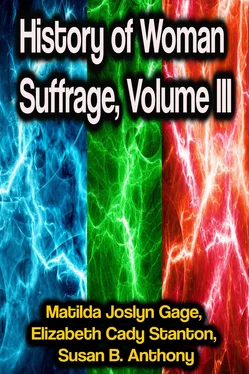This proposed amendment forbids the United States, or any State to deny or abridge the right to vote on account of sex. If adopted, it will make several millions of female voters, totally inexperienced in political affairs, quite generally dependent upon the other sex, all incapable of performing military duty and without the power to enforce the laws which their numerical strength may enable them to make, and comparatively very few of whom wish to assume the irksome and responsible political duties which this measure thrusts upon them. An experiment so novel, a change so great, should only be made slowly and in response to a general public demand, of the existence of which there is no evidence before your committee.
Marilla M. Ricker
Petitions from various parts of the country, containing by estimate about 30,000 names, have been presented to congress asking for this legislation. They were procured through the efforts of woman suffrage societies, thoroughly organized, with active and zealous managers. The ease with which signatures may be procured to any petition is well known. The small number of petitioners, when compared with that of the intelligent women in the country, is striking evidence that there exists among them no general desire to take up the heavy burden of governing, which so many men seek to evade. It would be unjust, unwise and impolitic to impose that burden on the great mass of women throughout the country who do not wish for it, to gratify the comparatively few who do.
It has been strongly urged that without the right of suffrage, women are, and will be, subjected to great oppression and injustice.
But every one who has examined the subject at all knows that, without female suffrage, legislation for years has improved and is still improving the condition of woman. The disabilities imposed upon her by the common law have, one by one, been swept away, until in most of the States she has the full right to her property and all, or nearly all, the rights which can be granted without impairing or destroying the marriage relation. These changes have been wrought by the spirit of the age, and are not, generally at least, the result of any agitation by women in their own behalf.
Nor can women justly complain of any partiality in the administration of justice. They have the sympathy of judges and particularly of juries to an extent which would warrant loud complaint on the part of their adversaries of the sterner sex. Their appeals to legislatures against injustice are never unheeded, and there is no doubt that when any considerable part of the women of any State really wish for the right to vote, it will be granted without the intervention of congress.
Any State may grant the right of suffrage to women. Some of them have done so to a limited extent, and perhaps with good results. It is evident that in some States public opinion is much more strongly in favor of it than it is in others. Your committee regard it as unwise and inexpedient to enable three-fourths in number of the States, through an amendment to the national constitution, to force woman suffrage upon the other fourth in which the public opinion of both sexes may be strongly adverse to such a change.
For these reasons, your committee report back said resolution with a recommendation that it be indefinitely postponed.
This adverse report was all the more disappointing because Mr. Wadleigh, as Mrs. Clemmer's letter states, filled the place of Hon. Oliver P. Morton of Indiana, one of the most steadfast friends of woman suffrage, who, at the last session of congress, had asked as a special favor the reference of our petitions to the Committee on Privileges and Elections, of which he was chairman, that they might receive proper attention and that he might report favorably upon them. In the discussion on the Pembina bill in 1874, Senator Morton made an earnest speech in favor of woman's enfranchisement. In his premature death our cause lost one of its bravest champions.
Senator Wadleigh's report called forth severe criticism; notably from the New Northwest of Oregon, the Woman's Journal of Boston, the Inter-Ocean of Chicago, the Evening Telegram and the National Citizen of New York. We quote from the latter:
The report is not a statesman-like answer based upon fundamental principles, but a mere politician's dodge—a species of dust-throwing quite in vogue in Washington. "Several millions of voters totally inexperienced in political affairs"! They would have about as much experience as the fathers in 1776, as the negroes in 1870, as the Irish, English, Italians, Norwegians, Danes, French, Germans, Portuguese, Scotch, Russians, Turks, Mexicans, Hungarians, Swedes and Indians, who form a good part of the voting population of this country. Did Mr. Wadleigh never hear of Agnes C. Jencks—the woman who has stirred up politics to its deepest depth; who has shaken the seat of President Hayes; who has set in motion the whole machinery of government, and who, when brought to the witness stand has for hours successfully baffled such wily politicians as Ben Butler and McMahon;—a woman who thwarts alike Republican and Democrat, and at her own will puts the brakes on all this turmoil of her own raising? Does Senator Wadleigh know nothing of that woman's "experience in politics"?
"Quite dependent upon the other sex." It used to be said the negroes were "quite dependent" upon their masters, that it would really be an abuse of the poor things to set them free, but when free and controlling the results of their own labor, it was found the masters had been the ones "quite dependent," and thousands of them who before the war rolled in luxury, have since been in the depths of poverty—some of them even dependent upon the bounty of their former slaves. When men cease to rob women of their earnings they will find them generally, as thousands now are, capable of self-care.[36]
"Military duty." When women hold the ballot there will not be quite as much military duty to be done. They will then have a voice and a vote in the matter, and the men will no longer be able to throw the country into a war to gratify spite or ambition, tearing from woman's arms her nearest and dearest. All men do not like "military duty." "The key to that horrible enigma, German socialism, is antagonism to the military system," and nations are shaken with fear because of it. But when there is necessity for military duty, women will be found in line. The person who planned the Tennessee campaign, in which the Northern armies secured their first victories, was a woman, Anna Ella Carroll. Gen. Grant acted upon her plan, and was successful. She was endorsed by President Lincoln, Seward, Stanton, Wade, Scott, and all the nation's leaders in its hour of peril, and yet congress has not granted her the pension which for ten years her friends have demanded. Mr. Wadleigh holds his seat in the United States Senate to-day, because of the "military duty" done by this woman.
"About 30,000 names," to petitions. There have been 70,000 sent in during the present session of congress, for a sixteenth amendment, besides hundreds of individual petitions from women asking for the removal of their own political disabilities. Men in this country are occasionally disfranchised for crime, and sometimes pray for the removal of their political disabilities. Nine such disfranchised men had the right of voting restored to them during the last session of congress. But not a single one of the five hundred women who individually asked to have their political disabilities removed, was even so much as noticed by an adverse report, Mr. Wadleigh knows it would make no difference if 300,000 women petitioned. But whether women ask for the ballot or not has nothing to do with the question. Self-government is the natural right of every individual, and because woman possesses this natural right, she should be secured in its exercise.
Читать дальше












